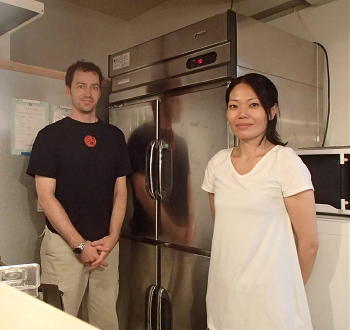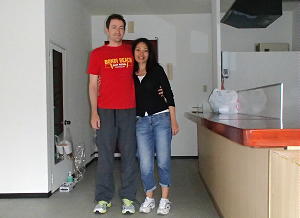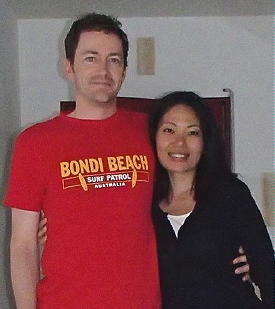LifeNets didn’t just help my shop, they actually helped a person.
(I hear you might like to know a little more about me.)
This is a story about how LifeNets Japan helped a victim of the Super Typhoon Halong in Kochi, Japan....on the island of Shikoku. The couple below had damage to their newly opened restaurant and were helped. You can read below Owen Wade's story. You can see his video thank you here. Special thanks to our LifeNets Japan director Dr. Yumi Yamamoto for fundraising and management of this charitable action.
Posted October 30, 2014
by Owen Wade
Like everyone, my life has had its ups and downs. Kochi people can’t understand why a guy from the New York area would want to settle in “the sticks” but when I first came here, it was a godsend that changed the course of my life, for which I will be forever grateful. After my father died suddenly when I was 18, I had to work hard to pay for school. After graduation I continued to struggle just to get by, and still had lots of student debt to pay. Eventually I managed to land a nice job in a country I had studied about and long dreamed of going to: Japan.
Owen Wade and his wife |
|---|
I loved my new work as a teacher, made lots of new friends, gradually paid off my loans, sent money home sometimes to family, learned about a new culture and a new city. I practiced karate three nights a week, learned a new language and could afford to donate to charity. Life was good. I had expected to stay a year or two but I fell in love with Japan, especially Kochi and kept staying “one more year.” That was over 15 years ago.
Life was very good but not perfect. An unscrupulous employer wouldn’t cover legally required insurance and fired me suddenly, timing it just before my visa expired so I couldn’t fight back, right as the the 2008 economic meltdown began. I found myself without income, facing large fines and back payments due to the former employer’s shady practices, and facing the prospect of being kicked out of the country when my visa ran out in a matter of weeks, to return to the expensive New York region unraveling from the Wall Street mess, with no job, no car, no apartment. Not to mention saying goodbye to my adoptive home and people here that I both loved.
I chose to stay and start my own business, a small English conversation school. Japanese and non-Japanese friends helped me navigate the mysterious immigration and tax systems. Everyone was panicky about the economy. I took odd jobs all over the prefecture, often working in five different far apart locations in the same day. I dug into savings. It was very hard at first but after several years I’ve recently gotten back on my feet.
During this time I met and married a wonderful Kochi woman. We were happy together but she too grew tired of insecure jobs that forced her to work long, stressful hours at little pay and with no chance of improvement. We thought it might be a good time to try and start a new business for her.
 |
|---|
We loved the area where we have been living for almost 10 years, an area called “Nakamama.” It is a neighborhood of the city but it feels like a friendly village where people know each other and try to make it a better place together. It looks like an impossibly nostalgic location from a TV drama where you say hello to the butcher on your way to the flower shop. I live in a single house with a garden, but I can walk to a big supermarket, post office, video rental shop, fresh fruit stands, delicious restaurants and more. You can take a short bicycle ride to the heart of downtown, or go the other way and swim in a beautiful river. Once the post office accidentally short-changed me by about ten cents. Twenty minutes later they hunted me down having lunch at a local cafe and returned the correct amount. For an American, being able to walk places and know the people I deal with is a rare treat, a greater luxury than a big yard, I think. Sadly it is disappearing in Japan too.
The local shop owners had been very welcoming of my school, so we decided to open the new cafe for my wife in the area too. Rather than just bemoan the decline of local shops we could join in and do something about it. We spent months scouting locations, preparing the menu, finding suppliers, fixing the kitchen. We dug deep into our savings. After a lot of 12- and 14-hour days and the occasional fight, we finally opened on July 6, 2014.
Running our cafe was a lot of work, plus my regular job was busy. We were exhausted but also excited that our vision was coming true and the taste of independence it offered. Then just one month after we first opened our doors Biblical rains fell. A month’s worth in three days. Our shop was in one of the worst hit areas. Police told us to leave and TV cameramen swarmed the street. Locals told us it was the worst they had seen in 45 years. My wife and I were devastated. Our new shop looked finished.
Then the support started to pour in. Most of it was in the form of love and concern, but it gave us energy to keep going. Friends and nearby shop owners with their own problems helped with the cleanup and disinfection. The rains continued, it would turn out for weeks, but at the time we were concerned by something else on the horizon. Just a few days after the flood, a “super typhoon” was coming.
 |
|---|
We were worried for two reasons. We might get damaged again, plus it could mean the cancellation of the huge annual festival that we were counting on to help us get back on our feet. The Yosakoi festival can be imagined as a kind of Japanese Mardi Gras. It is four days of dancing and fireworks, and has inspired imitations all over Japan. Teams come from across the country. It is by far most important time of year in this poor city. Kochi is called typhoon alley but the festival had never been cancelled before, yet as typhoon No. 11 (Halong) neared they were considering it for the first time.
We had only just cleaned up from the flood, but now we had to prepare simultaneously for two conflicting scenarios: break everything down in case of another flood while gearing up for the big festival. Either one was a lot of work but we did both.
One issue facing us was that the fridge I had bought just five days before the flooding had been damaged. No fridge, no business. Elbow grease alone could not solve it. We thought our nice property insurance policy would help but sadly the fine print said otherwise. That’s when LifeNets found us.
To be honest, I had never heard of LifeNets. But LifeNets Japan director, Dr. Yumi Yamamoto, had heard about the damage to my shop and sought me out, offering help to buy sandbags, or a new fridge, whatever we needed to keep our struggling business alive. (And not afloat.) The news of LifeNets support came just in time and we were able to replace our fridge before the all-important festival. The quick offer of help and flexibility for my situation’s needs were a great relief during a very hard time. The morale boost was enormous too.
No one knew if the festival would be cancelled. The slow-moving typhoon was one of the worst in years, with winds I’ve never seen here before. Half of the old cherry tree in our yard snapped off. I had to get up and check on my shop several times during the night. In the morning the worst had passed and at 8am the announcement finally came: Yosakoi was on! Once again looking like an impossibly quaint TV drama, when the local dance team, supported by the stricken neighborhood shops, assembled in front of our shop to kick off the event, storm clouds slowly passing overhead, there were many cheers, hugs and a few tears among the crowd. It would be a special Yosakoi indeed.
I fought back the urge embarrass myself in public and cry. Thanks to LifeNets, I had important work to do.
Owen Wade
August 27, 2014
Kochi City, Japan
2,094
